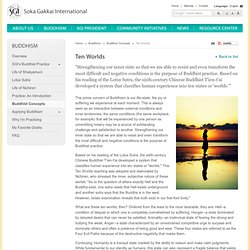

Ten Worlds. Back to list "Strengthening our inner state so that we are able to resist and even transform the most difficult and negative conditions is the purpose of Buddhist practice.

Based on his reading of the Lotus Sutra, the sixth-century Chinese Buddhist T'ien-t'ai developed a system that classifies human experience into ten states or 'worlds.'" The prime concern of Buddhism is our life-state, the joy or suffering we experience at each moment. This is always seen as an interaction between external conditions and inner tendencies; the same conditions (the same workplace, for example) that will be experienced by one person as unremitting misery may be a source of exhilarating challenge and satisfaction to another. Strengthening our inner state so that we are able to resist and even transform the most difficult and negative conditions is the purpose of Buddhist practice.
Conflict History. Untitled. Preface to Lyrical Ballads. William Wordsworth (1800). 1909-14. Famous Prefaces. The Harvard Classics. An Essay on Criticism. 'Tis hard to say, if greater Want of Skill Appear in Writing or in Judging ill, But, of the two, less dang'rous is th' Offence, To tire our Patience, than mis-lead our Sense: Some few in that, but Numbers err in this, Ten Censure wrong for one who Writes amiss; A Fool might once himself alone expose, Now One in Verse makes many more in Prose. 'Tis with our Judgments as our Watches, none Go just alike, yet each believes his own. In Poets as true Genius is but rare, True Taste as seldom is the Critick's Share; Both must alike from Heav'n derive their Light, These born to Judge, as well as those to Write. Let such teach others who themselves excell, And censure freely who have written well. Authors are partial to their Wit, 'tis true, But are not Criticks to their Judgment too?
Andrew Marvell: To his Coy Mistress. "Had we but world enough and time." (Cavalier poem, Carpe Diem)